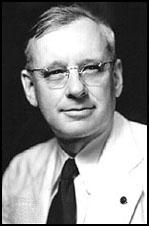Alfred Landon

Alfred Landon was born in West Middlesex on 9th September, 1887. After graduating from the University of Kansas in 1908 he joined the oil business.
In 1912 Landon campaigned for Theodore Roosevelt and the Progressive Party. Landon wrote: "I do not think there is anything new or revolutionary about the distribution of wealth theory. Every wise statesman in every period of history has been concerned with the equitable distribution of property in his country." Roosevelt's proposed program included women's suffrage, direct election of senators, anti-trust legislation and the prohibition of child labour. Roosevelt won 4,126,020 votes, but as he split the traditional Republican Party vote, he enabled Woodrow Wilson, the Democratic candidate, to be elected.
Landon served in the United States Army during the First World War. After the war he joined the Republican Party and in 1932 was elected governor of Kansas. The journalist Raymond Gram Swing interviewed him during this period: "I found Governor Landon as attractive as anyone I had personally encountered in American public life and said so. His views appeared to me nearly as attractive as his personality.... I found that the Governor believed in social insurance and collective bargaining, which to me were the two essentials of a new era."
Landon was re-elected in 1934. At his inaugural address in 1935 he said: "America bids fair to join in the procession of nations of the world in their march toward a new social and economic philosophy... Some say this will lead to socialism, some communism, others fascism. For myself I am convinced that the ultimate goal will be a modified form of individual rights and ownership of property out of which will come a wider spread of prosperity and opportunity."
Landon was chosen as the party's presidential candidate to stand against Franklin D. Roosevelt in 1936. Roosevelt was at the height of his popularity and easily won by 27,751,612 votes to 16,681,913.
After losing the election Landon returned to Kansas where he remained active in politics. Alfred Landon died in Topeka, Kansas on 12th October, 1987.
Primary Sources
(1) Raymond Gram Swing, Good Evening (1964)
My next - and final - articles in the Nation were on possible Republican candidates, and I wrote about Alf Landon, of Kansas, and Colonel Frank Knox, then publisher of the Chicago Daily News. The Landon articles, written after extended conversations with the Kansas Governor in Topeka, were frankly commendatory. I found Governor Landon as attractive as anyone I had personally encountered in American public life and said so. His views appeared to me nearly as attractive as his personality. He was being praised by Hearst as a Kansas Coolidge who had balanced his budget, and it was with these words ringing in my ears that I first met the Governor. He was so different that I went far, in my articles, in emphasizing the difference. The Landon I met was a Theodore Roosevelt Progressive, an intimate associate of William Allen White, a believer in civil liberties - he had chaired a Norman Thomas meeting in Topeka - and he was at odds with almost all the conservative Republican dogmas excepting reduction in the cost of government.... In a time when the "hate-Roosevelt" campaign inspired most Republicans, such moderate and liberal ideas were outstanding. I found that the Governor believed in social insurance and collective bargaining, which to me were the two essentials of a new era.
